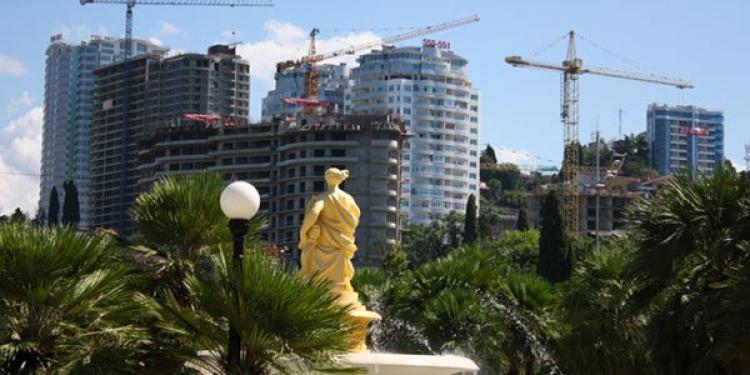Sochi Reborn: From Soviet Resort to Gambling Mecca
Posted: November 27, 2014
Updated: June 4, 2017

Sochi was overhauled in advance of the 2014 Winter Olympics. Fresh off the makeover, Russian
authorities hope the rebrand the city as a casino hub.
The Black Sea coast of Ukraine and Russia has been a popular vacation destination for more than two
centuries, serving Russian aristocrats, Soviet apparatchiks and now the emerging post-Soviet middle-
class.
The region has never attracted the critical acclaim of popular Mediterranean resort areas—in 1944
Winston Churchill famously referred to the war-torn Crimean city of Yalta as “the Riviera in hell”—but it
nonetheless has no shortage of pristine sandy beaches. And finally the natural beauty is being joined by
modern tourism infrastructure.
The star of this show is Sochi, a city which played second fiddle to Yalta throughout the Soviet period
and fell into dilapidation following the Soviet collapse. But over the past four years it has undergone a
brilliant transformation in preparation for the 2014 Winter Olympics, and the authorities have decided
to make it a center of the country’s tourism industry.
Overcoming the odds to become a gambling zone
The trending gambling news out of Russia is that Sochi is to be developed into a hub for casino
gambling. Russian gambling laws were recently amended to incorporate Sochi into one of the country’s
four zones of legal gambling. Given that the country suffers from a dearth of legal gambling
opportunities, there is every reason to believe that a casino market could perform well.
- Russian authorities have decided to turn Sochi into a gambling hub
- The Black Sea resort city will host a large integrated “gambling zone”
- Russian gambling laws ban gambling except in four special zones
When the idea of legalizing gambling in Sochi was first floated in February 2014, Putin squashed it due
to the belief that it would “make it hard for people to vacation there as a family with children.” Given
that Russian poker rooms and casinos tend to be poorly regulated and often black market, gambling has
a tendency to be associated with organized crime.
Putin eventually warmed up to the idea however, possibly due to successful lobbying on the part of
powerful interest groups. Paul Rimple of Eurasianet reported that the state-owned Sperbank has
purchased a 92% stake in Krasnaya Polyana, a large resort which has been held up as a potential casino
site.

The move also provides a way for the state to recoup some of the costs of developing the city in
advance of the Olympics, which were reportedly the most expensive games in history with a cost of $50
billion. Several of the city’s resorts currently operate at a loss and are heavily indebted following the
Olympics, and opening their doors to gamblers could be a way to ensure their financial future.
The legislative measure to expand the gambling zone—which was accompanied by a measure to legalize
casino gambling in the recently annexed Crimea—was approved by each parliamentary party except the
Communists, whose leader Nikolai Kolomoitsev said that “the gaming business will stimulate nothing
but banditry and debauchery, we cannot vote for such laws.”
The potential to become an international hub
Sochi looks poised to become a popular gambling center in a country with very few of them. However,
the scope of its success will depend on its ability to attract tourists from outside of the country. The
Black Sea region currently has few places of legal casino gambling, so there is potential.
The biggest immediate competitor is Georgia, where the resort city of Batumi lies 370 kilometers to the
south of Sochi. Owing to a pristine natural location and low licensing fees (a license costs roughly
$140,000), the city is now home to several large casinos attracting visitors from Turkey, Azerbaijan and
Iran.
If Sochi is able to poach large numbers of gamblers from these countries, its industry will be considered
a success. It does have some competitive advantages. Its nearby ski slopes make it a tourist destination
in both summer and winter (Batumi has only a short summer tourist season), and Turks and Azeris enjoy
visa free travel to Russia for periods of up to 30 and 90 days, respectively.
There is one caveat, however. Most wealthy Russians prefer to go overseas to vacation, meaning that
the city will likely never capitalize on the wealthy high rollers that drive casino revenue in more
luxurious locales. According to Mehmet Esen, finance director of the Peace Casino in Batumi, “Russian
high-rollers go to Macau or Monte Carlo.”
In addition, some private investors are wary of putting their money into a project with seemingly little
long-term strategy. For example, it isn’t yet clear whether the gambling zone will be at Krasnaya Polyana
or closer to the city center or closer at the Olympic Park Media Center.
There is also uncertainty about regulation and tax rates, with Russian gambling laws needing serious
upgrading. Multinational investor Mustafa Yilmaz recently remarked at a gambling industry conference
in Sochi: “It’s a big if; a big blank. We don’t know anything.”
But according Ian Livingston of the Casino Adjara in Tbilisi, the success of Sochi’s casino sector ultimately
comes down to the quality of the product: “If Sochi were to develop to such a degree as to be a mini-
Vegas, then we feel it might draw some of our foreign players from surrounding areas.”












